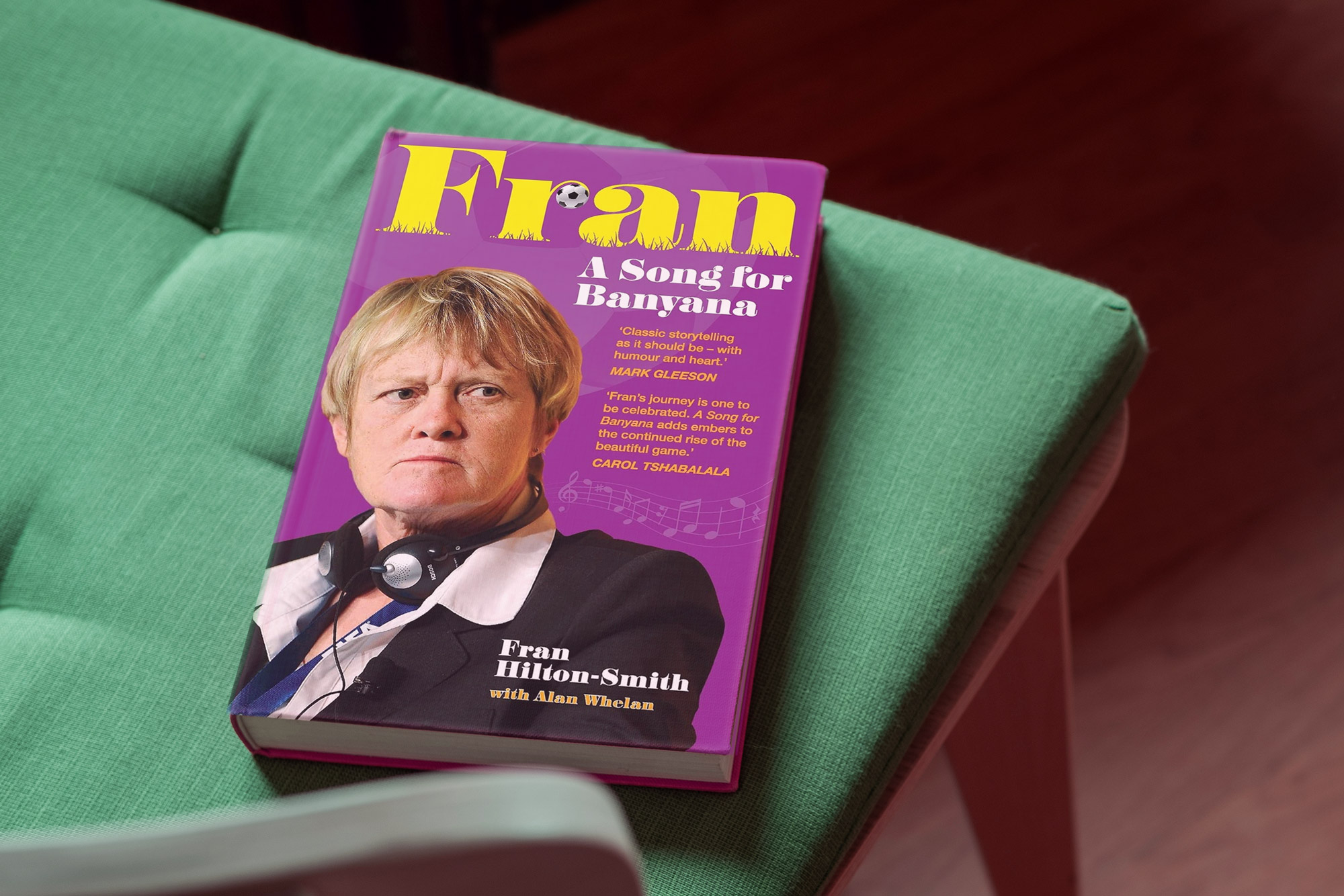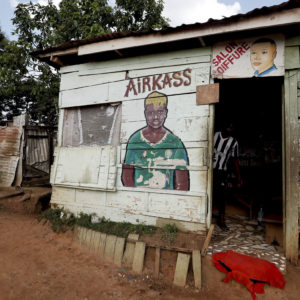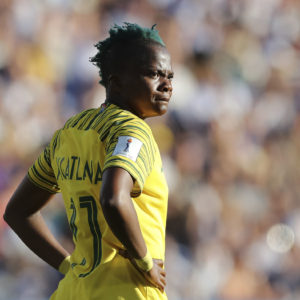Sharp Read | Fran Hilton-Smith wants dues paid
The football administrator who faced down death threats to get South African women’s football to where it is today calls for more than equal pay in her book Fran: A Song For Banyana.
Author:
31 May 2022

Respected football administrator Fran Hilton-Smith wants to transform the flame sparked by the American senior women’s national football team into a full-blown fire, to gut the misogyny that lies at the heart of the poor treatment women’s football endures in South Africa.
Inspired by the United States’ historic win, Hilton-Smith is calling for South Africa’s female players and support staff to be paid retrospectively for the work they did to put Banyana Banyana and women’s football on the map. The US women’s football team reached a landmark agreement with the US Soccer Federation, which they took to court in 2019 for alleged “institutional gender discrimination” after being paid far less than their male counterparts despite being more successful, more attractive to sponsors and the most watched of the two sides.
Even though the US team lost their court case, they won the war with the federation and the men’s side, coming to an understanding that will see both teams paid equally. The women’s team will also receive $22 million in backpay.
Related article:
To achieve this pay equity, the unequal money that US men and women receive from Fifa for their participation in the World Cup will be pooled and distributed equally. This addresses the fundamental problem in the struggle for equal pay in football: the staggering difference in what men and women receive from Fifa for participating in its global showpiece. France took home $38 million for winning the 2018 men’s World Cup, whereas 24 teams shared $30 million at the 2019 women’s World Cup – and this was a 100% increase from the $15 million on offer in 2015. The men’s World Cup in Russia in 2018 had a total pot of $400 million.
This imbalance means that without political will, equal pay in football among other national teams will never be reached. In South Africa, the imbalance is huge. Banyana Banyana players receive R4 000 for a draw and R5 700 for a win in a competitive match, while Bafana Bafana players are paid R60 000 for a win and R30 000 for a draw.
What makes this worse is that women’s football in the country is still amateur, so for many players Banyana is the only place where they earn a salary while the men who compete in the Premier Soccer League and abroad are paid this money on top of the good salaries they receive at their clubs. For equal pay to be achieved in the country, men would have to make a sacrifice.
A remarkable life
Hilton-Smith wants more than that to happen. “Now that women’s football in South Africa is on a more secure footing, perhaps there should be some financial acknowledgement for all the years when staff and players performed for no monetary reward,” she says in her memoir Fran: A Song For Banyana (Basadi Press 2021), ghostwritten by Alan Whelan.
She knows well the injustice women have faced in the game after working in various roles at the South African Football Association (Safa) for 20 years, from coaching Banyana to serving as team manager and the association’s technical director for women’s football. She is also a Council of Southern Africa Football Associations, Confederation of African Football (CAF) and Fifa instructor who has mentored many women who are now coaching national teams.
In the book, Hilton-Smith documents the sacrifices she made to transform Banyana into a force in African football. She had to beg, borrow and steal to get the women’s national teams basic necessities. “It was a constant struggle to get a decent kit for all the teams – and to prevent it disappearing. As late as 2018 all three women’s teams were sharing one set of boots – and then they were lent to the boys Under-17 team who were also ill-shod. More embarrassingly, in the early days we were given old Bafana kit with the men’s names on the back!”
This didn’t discourage Hilton-Smith and women such as Mary-Jane Sokhela and Hilton-Smith’s partner Dara Caroll, whom she describes as the “unpaid national team manager during the early 1990s”. These women and others planted the seeds that are now bearing delightful fruits, with a number of Banyana players now campaigning in Europe along with more investment in the women’s game.

It’s still not enough, but it is a huge improvement from the challenging times Hilton-Smith and company faced in the years after Banyana Banyana made their international debut on 30 May 1993 against eSwatini. This included death threats when she was among those who blew the lid on the corruption at Safa during the Pickard commission, which led to the sacking of former president Stix Morewa.
“One day someone cruised slowly down the road and shot at my house. Then my vice-president, Thembi Khumalo, was threatened that she and her children would be harmed and her house burnt down,” Hilton-Smith writes. Nonetheless, she fought for what was right.
By the time Hilton-Smith gets to this chapter of her life in the book, you understand why she wasn’t rattled by death threats. Her upbringing in Germiston toughened her up. She belonged to a couple of biker clubs and at one point owned a “powerful Astra Magnum .357”.
Hilton-Smith has lived a remarkable life and this book details that. She was a jack-of-all-trades athlete, a teacher and a musician before embarking on the football administration career that would come to define her. Her experience came in handy when she ventured into football. Her teaching background made the transition to being a coach and instructor easy while her music past was helpful when sponsors Sasol recorded a song for Banyana.
Losses explained
The book, while illuminating, could have been better edited. It inadvertently shows why Banyana – despite the country’s resources – have never won the Women’s Africa Cup of Nations (Afcon). Hilton-Smith falls into the trap of viewing Africa as this dark continent, with its only light in Eskom-powered South Africa. This mindset has seen many unfancied sides whom they took for granted knock South African teams’ lights out in continental football.
Hilton-Smith dedicates an entire chapter to Nigeria, the most dominant side in African women’s football and a thorn in Banyana’s side. The Super Falcons have won 11 of the 13 continental competitions that have been played and Hilton-Smith spends most of that chapter complaining about Nigeria’s gamesmanship when they host teams. While that is definitely a problem in African football, it’s not the only reason why Nigeria are this dominant and consistently wipe the floor with Banyana. Of the nine titles the Super Falcons won when the Women’s Afcon was held in one country, only three came from when Nigeria were hosts. The other six came from trips to South Africa (three times), Namibia, Cameroon and Ghana.
Related article:
There are some cringeworthy revelations. “When travelling in Africa, we usually insisted on half a chicken per person because at least it was food we recognised and not some unidentifiable bushmeat.”
This is a mentality that has hamstrung South African teams for years. Such a heightened sense of self-worth creates a vulnerability, in that they are easily sidetracked by the slightest discomfort in a contest where talent is not enough and mental strength plays a role. The current crop of Banyana players have improved in that regard, which is why they are among the favourites to win the Women’s Afcon in Morocco from 2 to 23 July.
Politics and pettiness
Seeing Banyana become African champions in her lifetime would be massive for Hilton-Smith, especially coming 29 years after the team took its first steps in the international arena. She left Safa unceremoniously but will likely be in Morocco through her work with CAF.
She did, after all, almost miss the moment she had been working towards since Banyana Banyana played their first ever match. Petty politics were at play when she was told she wouldn’t be part of the senior women’s national team’s biggest achievement. “My whole life I had waited for this moment, ever since I scrimped and saved to attend the 1995 tournament in Sweden and later in the USA 1999 and 2003, China 2007, Germany 2011 and Canada 2015,” she says.
“For years my dream of Banyana Banyana reaching the World Cup had been all I talked about to anyone who would listen. Everyone in football knew what it meant to me. That included [Safa president Danny] Jordaan.”
Related article:
But that didn’t stop Jordaan, Hilton-Smith says, from firing her on the eve of Banyana’s maiden Fifa women’s World Cup appearance in France in 2019. “After 20 years of loyal service, in his great wisdom Jordaan used the excuse that I was too old for the job and retired me off, ostensibly because I had reached the age of 60 (in fact I was 66),” she says of Jordaan, who was 68 at the time and at 70 is running for re-election for a third term as Safa president.
“Neither he nor chief executive Russell Paul were man enough to tell me face to face, so they asked Neil Tovey, then technical director, to disperse the bad news.”
This incident is revealing when it comes to how the current Safa regime has deteriorated into a shameful tyranny. The organisation has never properly honoured the women who laid the tracks on which current executives are now riding the gravy train. It’s probably why Hilton-Smith doesn’t only want the current women players to be paid the same as the men but is also calling for reparations for those women who selflessly brought the women’s game to where it is now.



